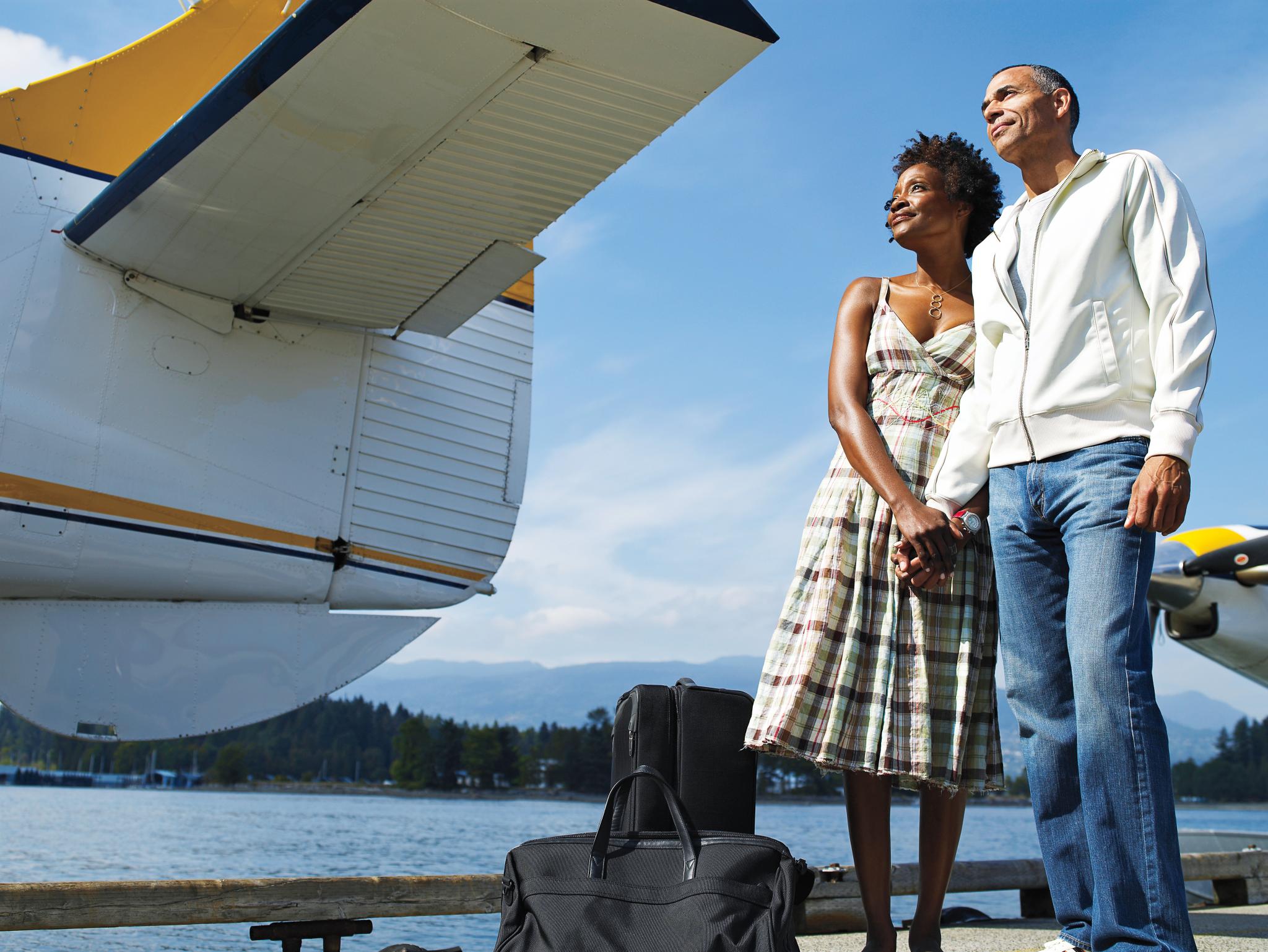
Raise your hand if you’re tired of hearing “There are no good men out there.” Do we really believe there are no quality guys left on the planet? It’s not a small world after all, with a population of more than 7 billion. If you’re a sister riding the “no good men” train and haven’t ventured beyond the 100-mile Tinder radius, consider taking a cue from Black women who have crisscrossed continents and discovered love. Phoenix-based fortysomething Tanya M. Lee says a man wasn’t on her list of things to bring back from Senegal on a visit with her mother in 2002. So Lee was surprised when she met Lamp, a local videographer who assisted when her mom fell ill on the trip. “Something very special was sparked through a crisis. It was ten days of getting to know someone,” says Lee.
Importing a Husband
After nearly two weeks working with Senegalese doctors and the U.S. embassy, Lee and her mother finally returned stateside. Her mom was soon diagnosed with a terminal illness, and sadly she died a few months later. While Lee mourned, she remained in close contact with Lamp. Just six months after her inaugural trek to Senegal, she was boarding a plane to see him again. Lee asked a girlfriend to tag along for moral support and to give feedback on this brother, whom she’d already begun to think of as her boyfriend.
Lee believed Lamp was genuine, but she couldn’t help but consider the cautionary tales she had heard about foreigners looking for American women to marry for a U.S. green card. “The true test of any marriage is time,” she says. Lee decided the relationship with Lamp was worth pursuing. She was wise to follow her heart and instincts: This year, the couple, who have a 9-year-old daughter, celebrated their twelfth anniversary.
When it was time for her husband to move to the States, Lee had difficulty with immigration procedures. The experience inspired her transition from being a corporate attorney for Procter & Gamble to providing legal counsel to couples and families dealing with immigration issues. “The only way to sponsor a future spouse is through a fiancé visa,” she says. But “quick” can mean nine months to a year. The process includes establishing your U.S. citizenship, showing you and your betrothed have met in person within two years and documenting income to prove your partner won’t need public assistance. Once the visa is approved, there’s a mad dash for the future spouse to move and marry. A couple have to wed in 90 days with the visa and then can apply for a green card.
Alternatively, some African-American women choose to leave the U.S. for good. Take Johari Murray, 39. She grew up in New York and was a 19-year-old student studying abroad in Salamanca, Spain, when she met Agustín at a party in 1996. “We talked until the sun came up,” she says—no easy feat considering her broken Spanish. Upon returning home, Murray announced to her mother, “I met the man I’m going to marry.” Nearly a decade later, she did.
The couple now live in Cåceres, Spain, with their son and daughter. Murray works as an educational entrepreneur, and has permanent resident status in Spain while maintaining her U.S. citizenship. She and her husband have journeyed back and forth between Spain and the U.S. for their jobs.
Improving the Odds
Sometimes being the most desired woman in the room can happen in the few hours it takes to travel somewhere new. Chelsea Como hopped a plane to Italy from her hometown of Miami in 2009. Her sister had died in a tragic car accident a few years before, prompting Como to start really living life.
On blackgirltravel.com, Como purchased a slot on a group tour to Italy with 59 other Black women. The trip reignited her self-confidence, something she didn’t realize had been missing. “I felt invincible,” says twentysomething Como. “I’d walk down the street and men would just start clapping.” Buoyed by the self-esteem boost from her first trip, Como sojourned in Italy every year that followed. In 2012 she relocated there for good.
The spontaneous applause Como experienced is the kind of respectful yet enthusiastic appreciation of Black women that Fleacé Weaver, travel agent and founder of BlackGirlTravel, loves to see. “Too many Black women feel as if they’re on the bottom rung of the dating ladder,” Weaver says.” It’s my mission to get us to not just fish in the same shallow pond.” Her goal is awesome travel for Black women. Sparks flying between vacationers and handsome local men is icing on an international cake.
Before moving to Rome, Como had dated only one or two guys in the U.S.—and never dated outside of her race. She’s now planning to move in with her Italian boyfriend of two years.
Going Global From Home
For all their positive results, trips like Weaver’s don’t come cheap. They can average $2,300 to $3,500. If you can’t afford the splurge right now, try an international dating site like afroromance.com or tourbar.com, which connects prospective travelers. The free dating app Wamba boasts more than 31 million users in 15 countries.
Whatever your strategy, here’s the happily-ever-after upshot: If you’ve been unsuccessful at finding love in the home of the brave, there’s a new frontier that awaits—and it’s right across the Atlantic.
This article originally appeared in the August 2015 issue of ESSENCE magazine, on newsstands now!
